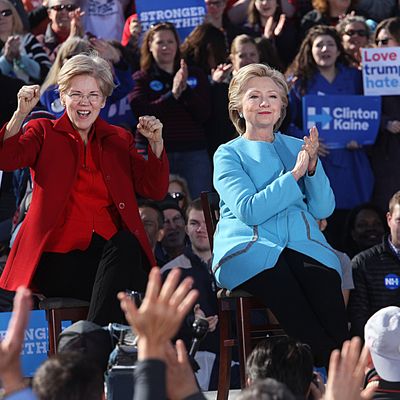
The conventional wisdom holds that Elizabeth Warren is locked into a left-progressive “lane” in the Democratic presidential nominating contest alongside Bernie Sanders, and can only win by taking him down and then challenging “centrists” for control of her party. But as she gains strength in national and early-state polls, something different and quite interesting is beginning to happen, at least at the elite level: Those party centrists are warming to her. Politico provides some eyebrow-raising examples.
Recalling a 2013 Wall Street Journal op-ed by two co-founders of the outspokenly centrist group Third Way that criticized Warren and newly elected New York mayor Bill de Blasio for trying to lead Democrats “over the populist cliff” into political disaster, Politico notes the very different tune being sung at a recent conference of the organization:
Jim Kessler, one of the authors of the 2013 piece warning that Warren would lead the party off the populist cliff, raved about the senator’s performance last weekend at the Black Economic Alliance candidate forum in South Carolina.
“Elizabeth Warren kills it at @BlkEconAlliance candidate forum. Love her entrepreneurship fund,” the Third Way co-founder tweeted Saturday.
“I don’t agree with ‘Medicare for All.’ I don’t agree with free college … [But] her consumer protection policies are great. I think she has a good infrastructure plan,” said self-described moderate Democrat Reagan Gray, a health care policy and political consultant attending the Third Way conference. “I absolutely know and believe people are taking a second look at her. She now seems to be getting herself away from the Bernie Sanders grouping. People are taking a second look at her and saying, ‘Hmm. Some of her policies are good. Maybe she isn’t like Bernie.’”
To anyone who remembers the furious intra-Democratic battles surrounding former Senator Joe Lieberman, this quote is even more startling:
“What Warren has tapped into is that to most Democrats, it’s not about ideology [or] liberalism, it’s about the economy’s out of balance. Nibbling around the edges and offering stale, old Democratic ideas of raising the minimum wage and shoring up Medicare and Social Security are just insufficient to dealing with the scale and scope of the problems we’re facing in our economy,” said Dan Gerstein, who worked as a speech writer on the presidential and vice presidential campaigns of former Connecticut Sen. Joe Lieberman. “But she’s doing it in a way that doesn’t necessarily demonize business, but talks about the bad actors in capitalism. And again, very much differentiating [herself] from Bernie.”
If you weren’t paying attention to the broader context, you might think these “centrists” are in some sort of panicky stampede to Warren as the only candidate who can beat Sanders. And indeed, that’s exactly how the Sanders camp reacted to the Politico story:
The trouble with this theory is that Sanders is presently looking weaker than at any time since his emergence as a serious challenger to Hillary Clinton in 2015. Perhaps he will regain momentum — he certainly has the resources to do so — but this would be a strange time for those in the party who strongly dislike him to freak out at the “threat” he represents. It’s actually just as likely that the people quoted in the Politico article are looking around for an alternative to their presumed favorite, Joe Biden.
But as someone who used to live and write in the same ideological space as Kessler and Gerstein, I think what’s really going on is that they themselves have changed since 2013, in response to the same Republican–Trump extremism and the radically shifting conditions in the country that have galvanized (and even radicalized) so many other Democrats. Like everyone else, they’re shocked by what happened in 2016, and chastened by the defeat of the centrist Democratic nominee. And for all her populism and class-warfare rhetoric, Warren is the representative of a sharp-edged but familiar Democratic policy tradition that seeks to save capitalism from its excesses and restore economic competition, rather than treating it as dangerous or irrelevant. That, not fear of Bernie, is likely the reason for all the comparisons centrists make of her to Sanders; they share many of the same policy positions but arguably a very different perspective, as my colleague Eric Levitz observed some time ago:
Bernie Sanders describes himself as a democratic socialist, spent his formative years making documentaries about Eugene Debs, and believes that there is far too much competition in America’s deodorant industry. Elizabeth Warren identifies as “a capitalist to my bones,” spent her formative years as the (now nonexistent) kind of Republican who believed that markets couldn’t be truly “free” unless they were well-regulated, and has evinced zero interest in nationalizing Old Spice.
Levitz went on to say that these differences were of little practical significance in a political world where “Joe Manchin will likely have veto power over the next Democratic president’s entire domestic agenda,” but to people like Kessler and Gerstein and their enemies on the socialist left who are focused on the ideological direction of their party, it may matter a lot.
Beyond ideology, Warren is, after all, a reasonably conventional Democrat who endorsed Hillary Clinton, not Bernie Sanders, in 2016. Economic issues aside, her foreign-policy thinking reflects a dovish Democratic tradition instead of the actively leftist, Henry Wallace–progressive tradition that clearly inspires Sanders, who has stood outside the Democratic Party his entire career.
But forgetting about Bernie for a moment, Elizabeth Warren quite possibly could become one of those Democratic politicians uniquely capable, with her combination of passion and intellect, of putting together a mind-bending coalition of supporters who dislike each other — something Democrats have longed for since the day Robert F. Kennedy was assassinated. And if that coalition truly does begin to emerge, then it could dissipate the “electability” fears that have handicapped Warren’s campaign so far. If Joe Biden continues to become less and less plausible as a unifying figure for Democrats, someone needs to take his place. Why not Elizabeth Warren?






























